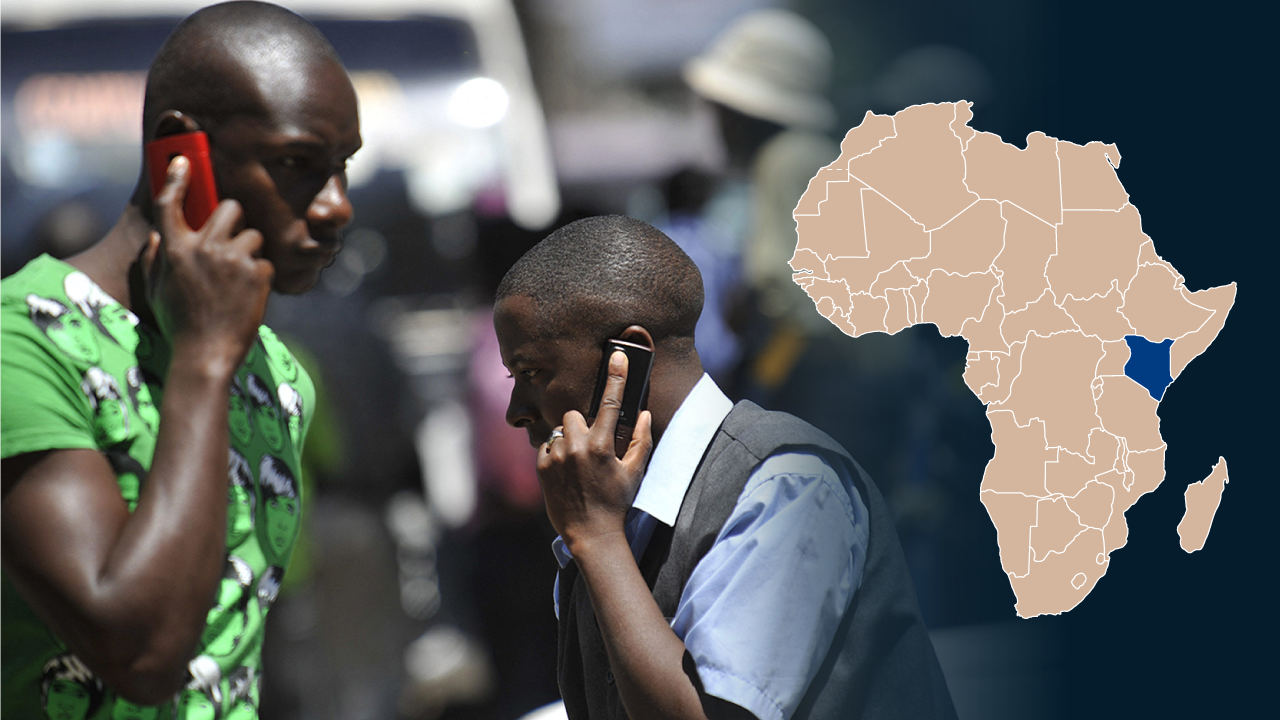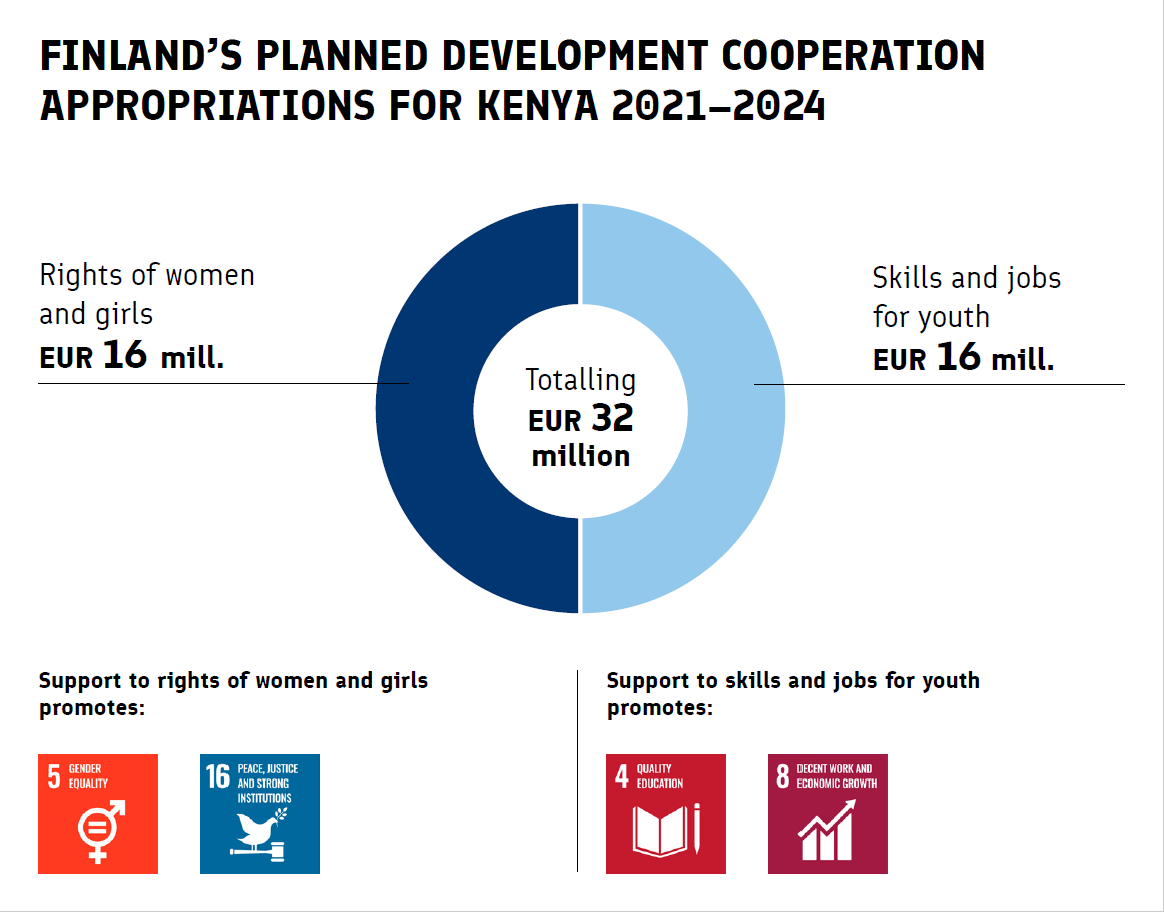Finland’s Relations and Development Cooperation in Kenya
Finnish development cooperation in Kenya improves the position of women in society and promotes youth employment.

Youth unemployment is a huge problem in Kenya. Fuzu, a service established by Finns, helps jobseekers and employers to find each other. The service has nearly a million users in Kenya and its neighbouring country Uganda. Organisations that have supported Fuzu include, among others, Finnfund, BEAM and Finnpartnership. Photo: Simon Maina / AFP. Lehtikuva
Kenya is one of the most stable democracies in Africa. Thanks to its advanced Constitution and diverse economic structure, Kenya achieved the lower middle-income country status in 2015.
Even though the Kenyan economy has grown rapidly, poverty continues to be a problem: approximately one third of the population live below the national poverty threshold. Corruption drains a major part of public funds. Rapid population growth creates challenges for the education system, and young people find it hard to find employment. In the long term, terrorism and ethnic conflicts threaten stability.
Finland has been engaged in development cooperation in Kenya since the 1960s. Projects have been conducted in several areas, supporting the water sector, forest management, good governance and equality. In recent years, Kenya has become less dependent on development cooperation, and its relations with Finland have become more diversified. By the side of traditional partnerships, cooperation is carried out by the private sector, educational institutions and civil society.
In future, Finland, together with other donors, will work to promote Kenya’s efforts to achieve the UN Sustainable Development Goals (SDGs) and the country's own national development goals.
The outcomes of Finland’s comprehensive activities in Kenya are described in the Country Strategy and the Country Programme. The latter focuses on development cooperation. The Country Strategy covers the years 2021–2024. Its main outcomes are to support Kenya’s stability; to contribute to the empowerment of women and youth; to accelerate sustainable and inclusive economic growth; and to help to mitigate and adapt to climate change.
Finland’s Country Strategy for Kenya 2021–2024 (PDF, 302 KB)(Link to another website.)
Outcomes of Finland’s development cooperation in Kenya in 2021–2024
In 2021–2024, Finland’s bilateral cooperation in Kenya will focus on improving women’s opportunities for participation in society, decreasing gender-based violence, developing technical and vocational education of youth, and increasing decent job opportunities. The financial frame for 2021–2024 is approximately 32 million euros.

In the previous programming period in 2016–2020, Finland concentrated on developing responsible and decentralised administration, supporting jobs and livelihoods, and improving the position of women and girls.
Finnish development cooperation supports the rights of women and girls
Finland’s development cooperation supports women’s opportunities for participation in public decision-making and peace processes and helps to reduce gender-based violence.
Expected outcomes: Women play an important role in decision-making and all women and girls are protected against the threat of violence
- Women have enhanced opportunities for participation in leadership and decision-making roles in society
- In accordance with UN Security Council Resolution 1325, women participate in peace processes, and the safety of women and girls is guaranteed
- Gender-based violence is better prevented, and more effective measures are employed to combat the threat of violence
Ongoing programmes and projects
- Support for participation in projects run by UN Women, focusing on public decision-making (Women in Leadership) and peace processes (Women, Peace and Security) and for fighting gender-based violence (Gender-Based Violence, GBV). The projects will cover the years 2020–2024, and the funding will amount to EUR 4.86 million.
- Strengthening citizens’ participation in preventing gender-based violence (GBV) in 2021–2022. CSO partnership with a funding of EUR 2 million.
- Bilateral programme on Prevention and Response to Gender-Based Violence. The project will be implemented in 2021–2024. Finland will allocate EUR 5 million for the project.
- Use of the Fund for Local Cooperation (FLC), for example to implement the 1325 National Action Plan at local level.
Boosting decent employment
Finland’s development cooperation supports the technical and vocational education and training of youth and their opportunities to find decent jobs with an adequate income.
Expected outcomes: Young women and men gain better vocational skills and competences and get decent jobs
- Young people are offered good technical and vocational education and training
- More decent jobs are created for young women and men
Planned programmes and projects
A joint project with Germany to improve technical and vocational education and training (TVET) in Kenya. Finland's contribution to the project is EUR 8 million for the period 2023-2026.
IFAD project to promote youth employment and entrepreneurship in agribusiness. Finland's contribution to the project is EUR 8 million for the period 2023-2026.
Highlights of the Results Report 2023
In 2023, Kenya suffered from high inflation, a depreciating currency, and rising cost of living. The government implemented austere economic reforms, and the opposition organized protests. A historically long drought turned into floods, and local conflicts and insecurity persisted in many parts of Kenya.
Concerning Finnish development interventions, steps were taken to advance key legislation supporting women’s participation in politics in line with the Constitutional two-thirds gender rule and to improve the legal and policy framework on sexual gender-based violence.
The localization of the National Action Plan for Women, Peace and Security continued with nine new county action plans, higher budget allocation and more women on peace committees – raising the share of women on peace committees to 34 percent.
The number of reported gender-based violence cases continued to increase, indicating enhanced awareness. Through Finnish support for UN Women, close to 40,000 gender-based violence survivors were supported in access to justice.
A new project aiming to boost youth employment through inclusive and private sector oriented technical and vocational education and training (TVET) began in January. The first year of implementation was successful, surpassing targets in several key areas.
The project attracted 33 new TVET institutions offering dual training courses, 331 companies offering training opportunities and 910 students to enrol in courses.
The targets were surpassed by 6 percent, 106 percent and 20 percent, respectively. Additionally, more Finnish institutions than initially anticipated will join the project through institutional partnerships, focusing on modern teaching methods, digital learning, and the greening of TVET.
Finland’s partners in Kenya
Finland works in Kenya as a member of the European Union and the donor community. As an EU Member State, Finland participates in the EU’s dialogue with the Government of Kenya, where the country is encouraged to develop good governance and democracy, to uproot corruption and to make effective use of its own resources. The EU’s key initiatives in Kenya are related to green growth and digitalisation, and Finland takes an active part in both of them.
Finland also supports economic and social development in Kenya by providing funding for UN organisations and international development finance institutions. Finland provides needs-based humanitarian assistance especially via humanitarian organisations of the UN and Finnish civil society organisations.
Several Finnish civil society organisations support the development of Kenyan society in collaboration with the country’s civil society actors. The support focuses, for example, on promoting human rights and the position of women and persons with disabilities.
Team Finland cooperation
Team Finland in Kenya aims to promote the image of Finland and to highlight Finland’s strengths.
Compared to other East-African countries, Kenya is a big and diverse economy with a fast-growing middle class. Team Finland works to strengthen the commercial relations between Finland and Kenya especially in the following areas: infrastructure development, energy, agriculture, water services and information technology.
Finland’s objective is to double its trade with African countries in 2020–2030. During the same period of time, efforts will be made to significantly increase Finnish companies’ investments in Africa and African companies’ investments in Finland. Finland supports, for example, TradeMark Africa in order to enhance Finnish companies’ opportunities to trade in Kenya and other East African countries.

